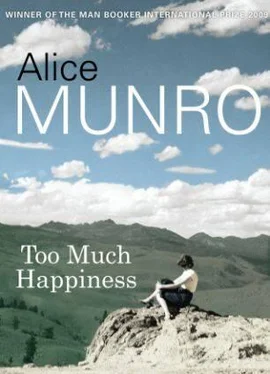She manages to reabsorb her tears, and when they reach Cannes, he folds her into his capacious well-cut garments with their smell of manliness-some mixture of fur-bearing animals and expensive tobacco. He kisses her with decorum but with a small flick of his tongue along her lips, a reminder of private appetites.
She has not, of course, reminded him that her work was on the Theory of Partial Differential Equations, and that it was completed some time ago. She spends the first hour or so of her solitary journey as she usually spends some time after a parting from him-balancing signs of affection against those of impatience, and indifference against a certain qualified passion.
“Always remember that when a man goes out of the room, he leaves everything in it behind,” her friend Marie Mendelson has told her. “When a woman goes out she carries everything that happened in the room along with her.”
At least she has time now to discover that she has a sore throat. If he has caught it she hopes he won’t suspect her. Being a bachelor in robust health he regards any slight contagion as an insult, bad ventilation or tainted breath as personal attacks. In certain ways he is really quite spoiled.
Spoiled and envious, actually. A while ago he wrote to her that certain writings of his own had begun to be attributed to her, because of the accident of the names. He had received a letter from a literary agent in Paris, starting off by addressing him as Dear Madam.
Alas he had forgotten, he said, that she was a novelist as well as a mathematician. What a disappointment for the Parisian that he was neither. Merely a scholar, and a man.
Indeed a great joke.
She falls asleep before the lamps are lit in the train. Her last waking thoughts-unpleasant thoughts-are of Victor Jaclard, her dead sister’s husband, whom she plans to see in Paris. It is really her young nephew, Urey, her sister’s child, that she is anxious to see, but the boy lives with his father. She always sees Urey in her mind as he was at about the age of five or six, angelically blond, trusting and sweet natured, but not in temperament so much like his mother, Aniuta.
She finds herself in a confused dream of Aniuta, but of an Aniuta long before Urey and Jaclard were on the scene. Aniuta unmarried, golden haired, beautiful, and bad tempered, back at the family estate of Palibino, where she is decorating her tower room with Orthodox icons and complaining that these are not the proper religious artifacts for medieval Europe. She has been reading a novel by Bulwer-Lytton and has draped herself in veils, the better to impersonate Edith Swan-neck, the mistress of Harold of Hastings. She plans to write her own novel about Edith, and has already written a few pages describing the scene where the heroine must identify her butchered lover’s body by certain marks known only to herself.
Having somehow arrived on this train she reads these pages to Sophia who cannot bring herself to explain to her how things have changed and what has come about since those days in the tower room.
When she wakes Sophia thinks how all that was true-Aniuta’s obsession with medieval and particularly English history-and how one day that vanished, veils and all, as if none of it had ever been, and instead a serious and contemporary Aniuta was writing about a young girl who at her parents’ urging and for conventional reasons rejects a young scholar who dies. After his death she realizes that she loves him, so has no choice but to follow him in death.
She secretly submitted this story to a magazine edited by Fyodor Dostoyevsky, and it was printed.
Her father was outraged.
“Now you sell your stories, how soon before you will sell yourself?”
In this turmoil Fyodor himself appeared on the scene, behaving badly at a party but mollifying Aniuta’s mother by a private call, and ending up by proposing marriage. Her father’s being so decidedly against this did almost persuade Aniuta to accept, to elope. But she had after all a fondness for her own limelight, and perhaps a premonition of how that might have to be sacrificed, with Fyodor, so she refused him. He put her into his novel The Idiot as Aglia, and married a young stenographer.
Sophia dozes again, slips into another dream in which she and Aniuta are both young but not so young as when at Palibino, and they are together in Paris, and Aniuta’s lover Jaclard-not yet her husband-has supplanted Harold of Hastings and Fyodor the novelist as her hero, and Jaclard is a genuine hero, though bad mannered (he glories in his peasant background) and, from the first, unfaithful. He is fighting somewhere outside of Paris, and Aniuta is afraid he will be killed, because he is so brave. Now in Sophia’s dream Aniuta has gone looking for him, but the streets where she wanders weeping and calling his name are in Petersburg, not Paris, and Sophia is left behind in a huge Parisian hospital full of dead soldiers and bloodied citizens, and one of the dead is her own husband, Vladimir. She runs away from all these casualties, she is looking for Maksim, who is safe from the fighting in the Hotel Splendide. Maksim will get her out of this.
She wakes. It’s raining outside and dark, and she is not alone in the compartment. An untidy-looking young woman sits next to the door, holding a drawing portfolio. Sophia is afraid she might have cried out in her dream, but she probably didn’t, because the girl is sleeping undisturbed.
Suppose this girl had been awake and Sophia had said to her, “Forgive me, I was dreaming of 1871. I was there, in Paris, my sister was in love with a Communard. He was captured and he might have been shot or sent to New Caledonia but we were able to get him away. My husband did it. My husband Vladimir who was not a Communard at all but only wanted to look at the fossils in the Jardin des Plantes.”
The girl would have been bored. She might have been polite but would still have conveyed the feeling that all this, in her opinion, might have happened before the banishment of Adam and Eve. She was probably not even French. French girls who could afford to travel second class did not usually travel alone. American?
It was strangely true that Vladimir had been able to spend some of those days in the Jardin des Plantes. And untrue that he had been killed. In the midst of the turmoil he was laying the foundations of his only real career, as a paleontologist. And true too that Aniuta took Sophia along to a hospital from which all the professional nurses had been fired. They were considered counterrevolutionary, and were to be replaced by the wives and comrades from the Commune. The common women cursed the replacements because they did not even know how to make bandages, and the wounded died, but most of them might have died anyway. There was disease as well as the wounds of battle to be dealt with. The common people were said to be eating dogs and rats.
Jaclard and his revolutionaries fought for ten weeks. After the defeat he was imprisoned at Versailles, in an underground cell. Several men had been shot because they were mistaken for him. Or so it was reported.
By that time Aniuta and Sophia’s father, the General, had arrived from Russia. Aniuta had been taken off to Heidelberg, where she collapsed in bed. Sophia went back to Berlin and her study of mathematics, but Vladimir remained, abandoning his tertiary mammifers to connive with the General to get Jaclard free. This was managed by bribery and daring. Jaclard was to be transferred under guard of one soldier to a jail in Paris, and taken along a certain street where there would be a crowd of people, because of an exhibition. Vladimir would snatch him away while the guard looked aside, as he was being paid to do. And still under Vladimir’s guidance Jaclard would be hustled through the crowd to a room where a civilian suit of clothes was waiting, then taken to the railway station and supplied with Vladimir’s own passport, so that he could escape to Switzerland.
Читать дальше












